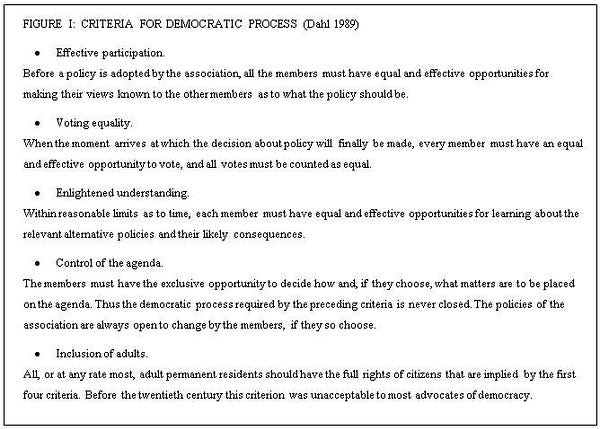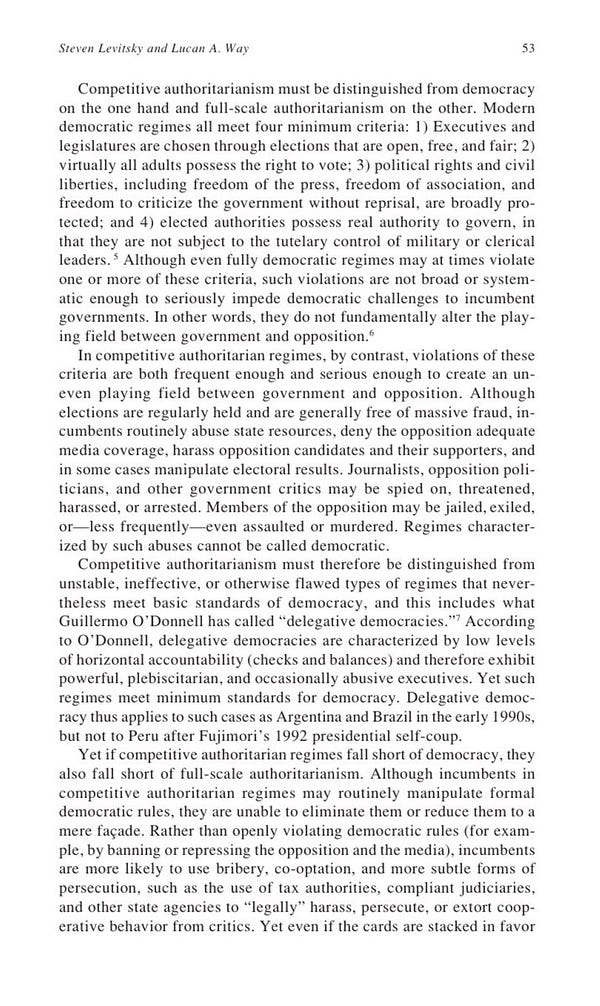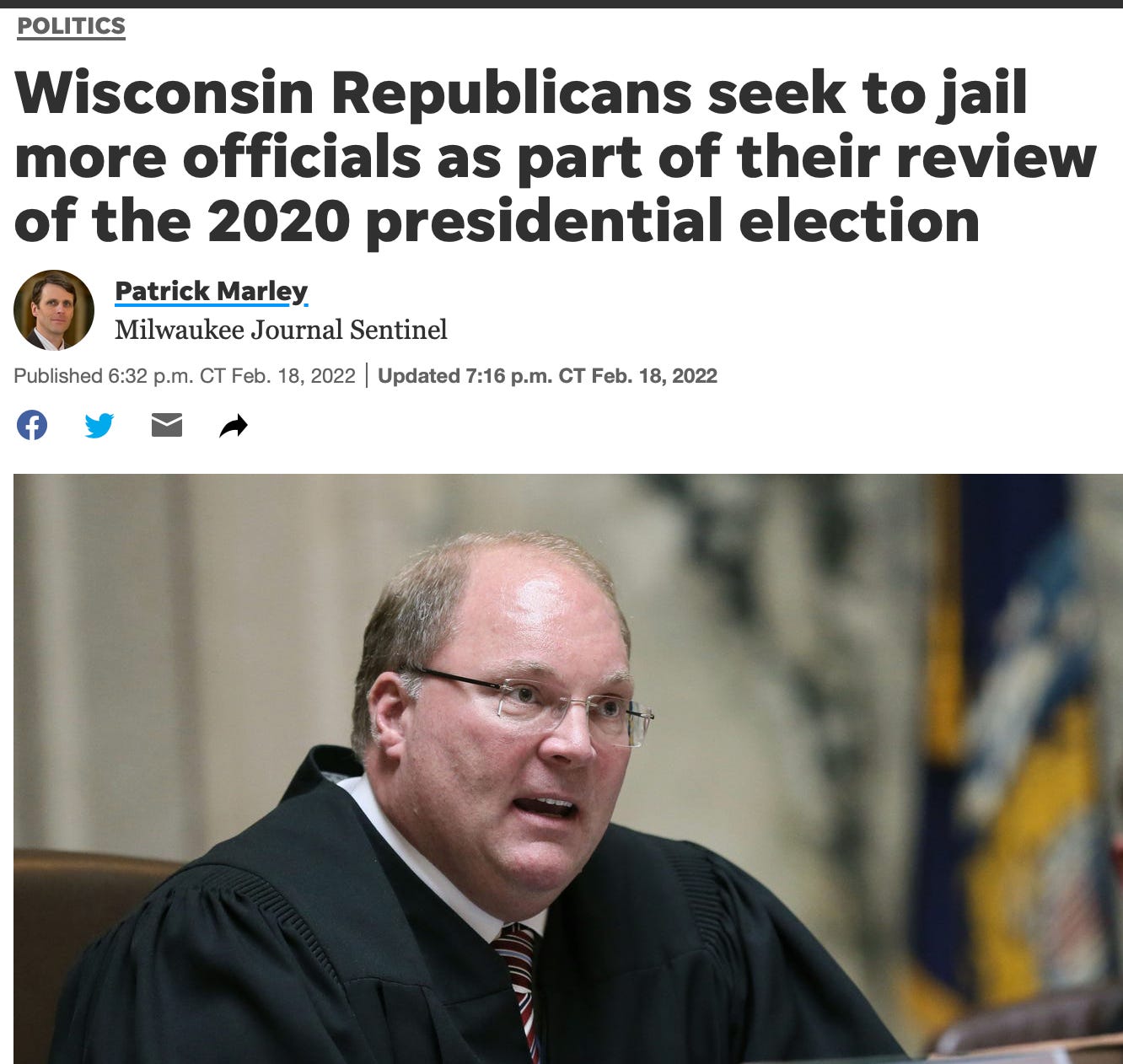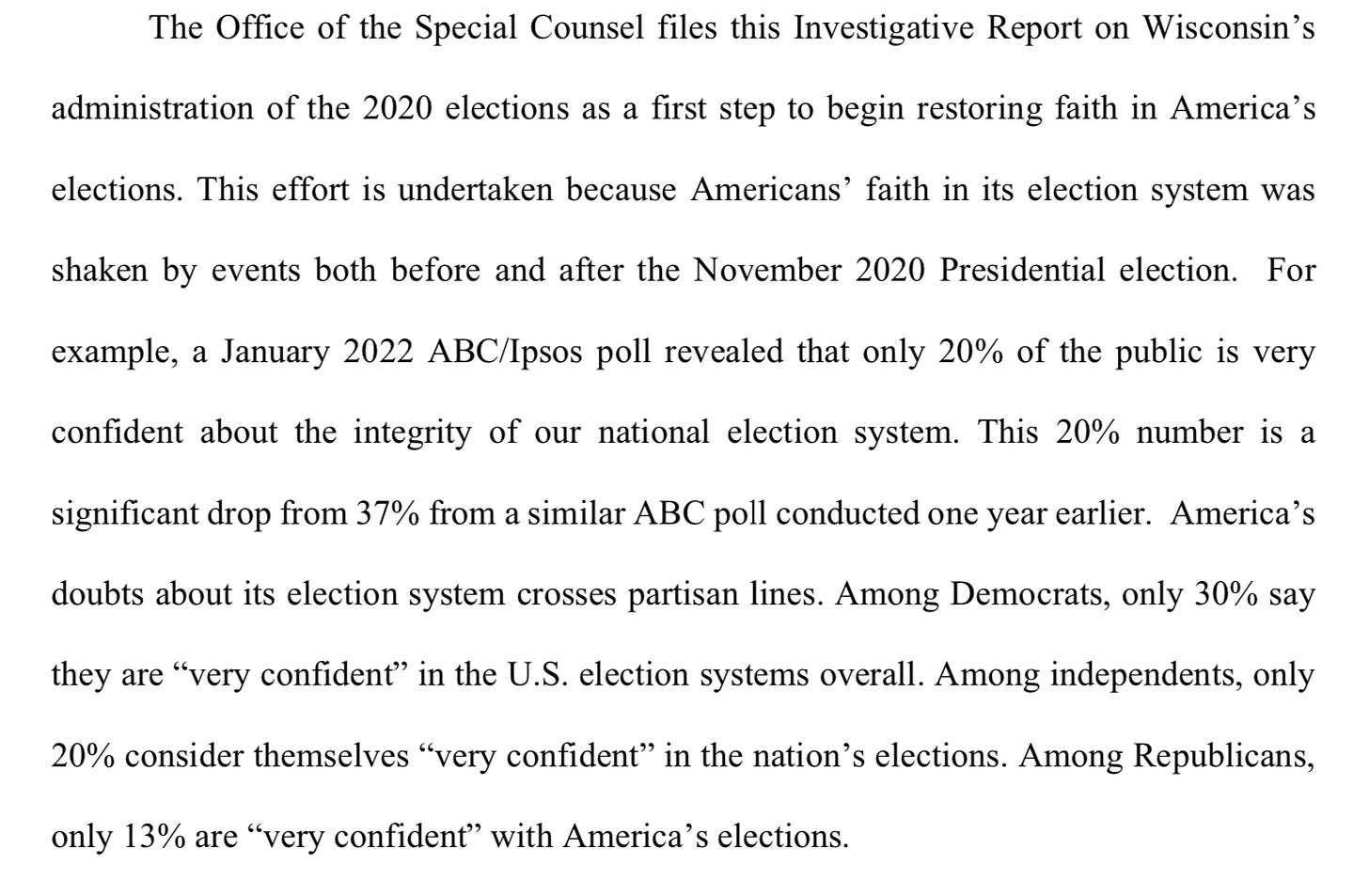How the bogus election audits serve to undermine democracy
A partisan Wisconsin investigation floats the idea of de-certifying the 2020 election
You should visit Wisconsin. Beautiful country, lovely people. Did you know it actually has more lakes than Minnesota? One thing you should know before your visit though: its getting harder and harder to describe it as a democracy.
On March 1st Michael Gableman released a report as part of his investigation of the 2020 election. Based on past form, no-one was expecting the Gableman report to be good per se, or even competent, but the sheer lunacy of the content still surprises. Here is a former State Supreme Court judge, appointed by Republican leadership, floating the idea that Wisconsin should de-certify its 2020 election.
Would you buy a used conspiracy theory from this man?
Photo: Mark Hoffman / Milwaukee Journal Sentinel
Decertifying the 2020 election is impossible, entirely unjustified, and an outrageous attack on American democracy. It is both perfectly emblematic of Donald Trump’s goal of rewriting history until he is declared the winner, and a warning sign of how far anti-democratic forces might go in the future.
Gableman fed the nonsense theory that a slate of presidential electors are "void and voidable" if people like him raise objections. Gableman also proposed eliminating the Wisconsin Election Commission, which oversees state elections. This is again consistent with the Trumpian mindset: accuse who declared that Trump had as engaged in some sort of corruption. Gableman’s radical solutions were justified by no substantive evidence, as I detail below, but on the conspiratorial mindset that continues to drive conservative politics and is reshaping the machinery of American elections.
To understand what is happening, I talked to some of the smartest people I know who study and understand Wisconsin politics and elections. Ken Mayer (@uwkenmayer) and Barry Burden (@bcburden), two former co-authors who have worked on studying election administration in Wisconsin and have served as expert witnesses in election cases across the country. Michael Wagner (@prowag) does research on political communications, including in-depth analysis of Wisconsin.
Here is what I learned.
Conspiracies rather than competence
Wisconsin has a highly decentralized election system that is complicated to understand. I studied it for years and still don’t consider myself a real expert. Many allegations of election fraud come from a basic misunderstanding of the nuts and bolts of the system.
One issue that stood out is that even after months on the job Gableman still hadn’t bothered to learn how elections in Wisconsin work. Here is how Ken Mayer put it:
Gableman said back in October that "most people, myself included, do not have a comprehensive understanding or even any understanding of how elections work." It’s clear that is correct, and that he didn't learn anything.
As Burden noted: “the report is riddled with misunderstanding, falsehoods, and innuendo.” (If you know how incredibly polite and diplomatic Barry Burden is, this would be even more shocking. Imagine Mr. Rogers dropping the F-bomb).
Gableman referred darkly to “Zuckerberg” 143 times in his report. Why? Five Democratic cities applied for grants from the Center for Tech and Civic Life to offset the extra costs of running an election during a pandemic. Priscilla and Mark Zuckerberg provided a large grant to this Center, which in turn provided support to local governments. Quite why it’s so bad to try to increase state capacity or voter turnout is unclear, but Republicans who have in the past made false claims of election fraud have argued that the grants were part of a plot to buy the election for Biden. Election officials who accepted the money engaged in a bribery scheme according to Gableman (Republican districts also took that money, but strangely were not accused of bribery).
Here is Mayer again:
The whole thing is an outrage — accusing election officials of bribery (which under the same logic would apply if I gave $50 to the League of Women Voters to support their registration drives), making ludicrously false claims that noncitizens "voted unimpeded," being completely wrong about HAVA [the Help American Vote Act], pushing the independent state legislature doctrine, and on an on. It reads like some random dude from Q-anon wrote it.
It wasn’t just Zuckerberg. In Gableman’s presentation there were numerous false mentions of George Soros also funding part of Wisconsin’s election system.
Burden notes:
Among other things, Gableman seems completely unaware of the existing audit procedures that take place before and after every election is Wisconsin. There is no mention the statewide recount in 2016 or two county recounts in 2020 that verified the integrity of those eletions. He has no idea what ERIC [Electronic Registration Information Center] is or that it actually helps to detect election fraud and administrative errors. It was not funded by "Soros."
Such a partisan and incompetent approach is emblematic of Gableman’s investigation. He has taken offices with a law firm that sought to overturn the election, and hid the names of his employees. He traveled to Arizona to watch their phony election audit and appears to taking advice from Mike Lindell, the pillow election conspiracist. For a group auditing the government, they provided some of most amateurish management of their own use of tax dollars I’ve ever seen.


Gableman’s penchant for secrecy extends to his investigations. He asked a judge to jail election officials and Democratic Mayors. Why? He wanted to interview them. Thay agreed, but simply asked that they take place in public, where Gableman’s incompetence will be on full display. Seeking to avoid embarrassment, Gableman insists the interview must be private, which hardly seems consistent with inspiring trust in the process.
If it’s not already obvious, the target of this investigation are exclusively election officials and politicians in Democratic regions. The point is to intimidate, smear and harass these officials until they quit in exasperation, or are forced out by voters who assume that with all these investigations, some wrongdoing must have occurred.
If this combination of incompetence, secrecy, conspiracism and threats seems familiar, it should be. It exemplifies in miniature the governing values of the Trump White House, now being deployed to undermine the basic processes of our democracy.
For many, Gableman’s report will reinforce what they already believed. Wagner talked about new research he is working on that shows that the diet of media sources people consume is associated with their political beliefs. Trump voters with a broad information diet are less likely to embrace extreme views like Gableman’s, but “in Wisconsin, Trump voters who use more far right media sources became far less trusting of social and political institutions in the state and far more supportive of racist political expression.”
The effect of the investigations is to undermine rather than restore trust
The politicians who called for these types of investigations (or for more restrictive voting laws) might acknowledge there is no substantial evidence of fraud, but claim that a good investigation will restore dwindling trust in government. When Robin Vos, the powerful Speaker of the Wisconsin Assembly appointed Gableman, he declared: “To restore full integrity and trust in elections, we have decided to change direction, giving more authority and independence to Justice Gableman.”
The very first paragraph of Gableman’s report uses the declining trust in elections as a justification for his investigation.
But such investigations have the opposite effect, by not just giving a platform to the wildest of conspiracy theories, but seeming to endorse them.
According to Burden, Gableman:
cites low public confidence in elections as a problem. Research shows that the best solution is for political actors to reassure their followers that the election results are trustworthy. Raising unanswered questions and making allegations as the report does undermine rather than bolster public confidence.
In other words, the key reason that trust in elections is in decline is because Republicans keep telling the public that the elections are untrustworthy, and then seek to change the rule of the games to ensure partisan control. Gableman’s report is a classic of this particular genre, and the product of the Trumpist wing of the party flexing its muscles.
With every election in Wisconsin there are standard audits. After 2020, Vos ordered an extra one from the Legislative Audit Bureau, a legislative watchdog with a stellar national reputation. It was done quickly and professionally and found what we already knew: that the election was free and fair, and the outcome was accurate.
Vos could have stopped there. He could have done what Burden suggested and embraced the results, and reassured his followers. Those actions would have allowed him to say a credible outside body reviewed the elections, and gave it a clean bill of health. Time to move on.
But he didn’t. Trump lambasted Vos for “working hard to cover up election corruption, in Wisconsin." GOP activists called on Vos to resign. Vos appointed two other investigations.
Vos OK’d a legislative investigation led by Wisconsin Assembly Representative Jean Brandtjen (below). A month *after* the election, Brandtjen declared that “There is no doubt that after the filed affidavits and lawsuit, Donald Trump won this election in Wisconsin and several methods of fraud were used to change the outcome.” This wasn’t an off-the-cuff or out-of-context remark. She posted it on her official Wisconsin Assembly webpage, where you can still find it. Prior to his appointment, Gableman had also declared the election to be “stolen.”
Photo: Mark Hoffman / Milwaukee Journal Sentinel
In other words, both of the investigations Vos appointed when he came under pressure from Trump were led by people who had already declared that the election had been stolen from Trump. If you wanted to inspire trust among the general public, these are not the people you would have chosen. But they were perfectly suited to launder conspiracy theories and further justify a partisan takeover of elections.
Brandtjen’s hearings have been a platform of misinformation. Many of the concerns raised reflect unfamiliarity with how elections are run in the state, and some dip into the election conspiracy world. For example Brandtjen invited testimony from a former felon who insisted that a Milwaukee sect had printed out their own ballots to vote for Biden. (See a thread about one of these hearings from a Wisconsin election clerk, its pretty wild). A couple of weeks ago, Brandjten headlined an event at the Wisconsin Capitol calling to overturn the 2020 elections. “You’re not crazy” she told her supporters.
If you have to say it…
Manufacturing a scandal to assert control
The substance of Gableman’s complaints that are based in fact are strikingly thin. He objected to efforts to relax rules during the pandemic to make it easier to people in nursing homes to vote, or use drop boxes. You might disagree with efforts to modify policies during a pandemic even if it means fewer people will vote. But these policies were relatively uncontroversial. For example, there was bipartisan support for the use of drop boxes during a pandemic. Wisconsin Republicans were even planning to codify the use of drop boxes as a permanent means of collecting ballots after the pandemic. Then Trump objected. The plan was dropped. Conservatives sued to declare drop boxes to be illegal. While the case is ongoing, “illegal drop boxes” is part of Gableman’s case for de-certifying the election.
This reflects a broader pattern where the analysis of election processes seems to have not just a tenuous relationship with the facts, but also feature a weak relationship between perceived problems and proposed solutions.
Burden notes:
One broad observation: Gableman's ultimate recommendations have almost nothing to do with the concerns that he raised in the hearing and the assertions made in the investigatory portion of the report. For example, he recommends that the state create a single statewide registration database (which it already has, as mandated by HAVA) and that it be made available more cheaply than the current $12,500 (a request that the GOP-controlled legislature heard well before 2020 and decided not to change).
Wagner suggests that sowing the seeds of such distrust provides the means to exert further control over the machinery of elections.
This is a story of a long-term project to negatively affect public confidence in institutions that are critical for the maintenance of civil society. It is hard to imagine why one would want to undermine public confidence in elections unless the goal was to change professional, non-partisan election administration into a purely partisan enterprise.
Republicans in Wisconsin are currently threatening to do away with the bipartisan Wisconsin Election Commission, and Gableman’s report provides justification to do do. The WEC, in turn, replaced the non-partisan Government Accountability Board, which the same Republicans plus Scott Walker put out of business when it looked too closely at Walker’s campaign finance practices. Having tried different iterations of bipartisan and non-partisan control and found them inadequate, expect them to push an alternative model of partisan control without accountability. This will almost certainly not come in the form of a statewide elected office, since statewide elections do not reliably return Republicans, but from legislative control of the process where gerrymandering ensures Republican control. Senator Ron Johnson suggested one model: the Republican legislature should just ignore the WEC-verified election results if it doesn’t suit them.
When do we stop being a democracy
I spent 13 years in Wisconsin, at UW-Madison’s public policy school, and watched it go from a purple state where the voters will mattered, to one where one-party control has become a fait accompli by virtue of that party using political power to shield themselves from the will of the voters. In many ways, the state has become unrecognizable, a formerly good government state now that looks less and less like a functioning democracy.
Don’t get me wrong. It has elections, and all the trappings of democracy. Its just that the rules of the game has been structured to that it doesn’t meet the basic standards of some common definitions of democracy. See below from another UW-Madison political scientist, Mark Copelovitch.




Is Copelovitch being alarmist? I don’t believe so. The last dozen years in Wisconsin have been one long process of democratic backsliding, consisting of one of the most extreme gerrymanders in the country and restrictions on voting access.
Democracies are also defined by the willingness of parties to cede power when they lose elections. Here, again, the record is not reassuring.
The governorship and Attorney General are two offices that Democrats can still win because they are not dependent on gerrymanders. As soon as they did, in 2018, Republicans convened a special session to strip them of their powers, a process that co-partisans on the State Supreme Court largely blessed. Even when Democrat Tony Evers took power, Republicans denied him the most basic authority, including the ability to appoint his own Cabinet, by refusing to schedule appointment hearings. The lesson is that Republican Governors in Wisconsin have political power, but Democrats do not. The reason the is so is because the bosses in the gerrymandered legislature, rather than the voters, have decided to rewrite the rules of the game to suit their interests.
Radical does not mean fringe
Things have gotten worse in Wisconsin since 2020. Trump lost, but refused to accept his defeat. A slate of alternative electors tried to insist that he won. One of them, Timothy Rathmun, is now the Trump-endorsed candidate for Governor solely on the basis of his declared intention to overturn the election. The New York Times profiled him as part of a “fringe scheme.”
“We’re not fringe,” Rathmun declared, and in some ways he is right. We should not assume that radical anti-democratic politics as a fringe position in the Republican Party any longer. One conservative activist in the state told state Republicans “that yesterday’s conspiracies may be today’s reality.” We should be worried that he is right, and consider the implications for the future of American democracy.
This is the part of the piece where I usually encourage you to share and subscribe to my newsletter. Instead, let me urge instead you subscribe to a local media source that provides irreplaceable coverage of attacks on democracy.







